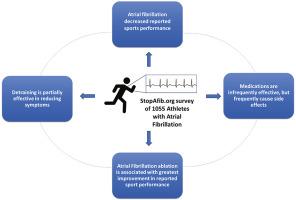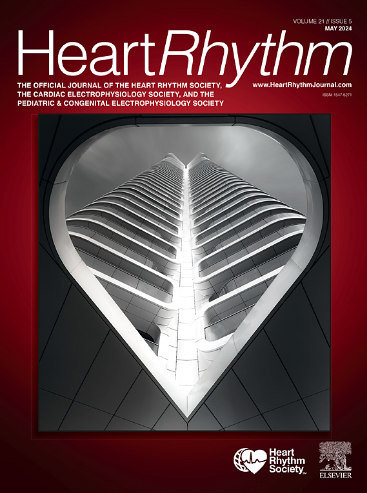Impact of atrial fibrillation and atrial fibrillation therapies on sports performance in athletes
IF 5.7
2区 医学
Q1 CARDIAC & CARDIOVASCULAR SYSTEMS
引用次数: 0
Abstract
Background
It has been hypothesized that both atrial fibrillation (AF) and medications for AF are poorly tolerated in athletes.
Objective
The purpose of this study was to determine the impact of AF and AF treatments on sports performance.
Methods
An Internet-based survey, initiated via StopAfib.org, queried the impact of AF and treatment modalities on sports performance, training, and symptoms. Performance (rated in comparison to personal best), frequency of training, and competition were compared before onset of AF symptoms vs when symptoms at worst, via paired Wilcoxon, and then similarly compared in relation to participants’ AF treatments.
Results
Between May 13, 2019, and February 29, 2020, 1055 athletes responded (78% male, median age 61–70 years). The sports most reported were cycling (25%) and running (20%). Development of AF was associated with declining sports performance, competition, and training frequency. Of 565 participants who detrained, 31% reported no change in symptoms, 56% reported decreased frequency, and 13% reported no further AF. Among athletes who received treatment, ablation was associated with greater improvement in sports performance than use of medications. Of 262 athletes currently taking medication, 27% reported that it was completely effective, 58% partially effective, and 15% not effective. Of 653 athletes who have taken medication currently and/or in the past, 43% reported side effects, most commonly fatigue, low energy, or decreased athletic performance.
Conclusion
Athletes reported that AF was associated with worsening sports performance. Among AF treatment modalities, ablation was associated with the greater reported improvement in sports performance than use of medications, which also had a high frequency of side effects.

心房颤动和心房颤动疗法对运动员运动表现的影响。
背景:据推测,心房颤动(AF)和治疗心房颤动的药物对运动员的耐受性都很差:确定心房颤动和心房颤动治疗方法对运动成绩的影响 方法:通过 StopAfib.org 发起一项网络调查,询问心房颤动和治疗方法对运动成绩、训练和症状的影响。通过配对 Wilcoxon 比较了心房颤动症状出现前与症状最严重时的运动表现(与个人最好成绩进行比较)、训练和比赛频率,然后同样比较了参与者的心房颤动治疗方法:19年5月13日至20年2月29日期间,共有1055名运动员做出了回应,其中78%为男性,中位年龄为61-70岁。报告最多的运动是骑自行车(25%)和跑步(20%)。房颤的发生与运动成绩、比赛和训练频率的下降有关。在脱离训练的 565 名参与者中,31% 报告症状无变化,56% 报告训练频率下降,13% 报告不再出现房颤。在接受治疗的运动员中,消融治疗比药物治疗对运动成绩的改善更大。在目前接受药物治疗的 262 名运动员中,27% 表示完全有效,58% 表示部分有效,15% 表示无效。在目前和/或过去服用过药物的 653 名运动员中,43% 的人报告了副作用,最常见的副作用是疲劳、精力不足或运动成绩下降:运动员报告称,房颤与运动成绩下降有关。在心房颤动治疗方法中,消融术比药物治疗对运动成绩的改善更大,而药物治疗的副作用也较高。
本文章由计算机程序翻译,如有差异,请以英文原文为准。
求助全文
约1分钟内获得全文
求助全文
来源期刊

Heart rhythm
医学-心血管系统
CiteScore
10.50
自引率
5.50%
发文量
1465
审稿时长
24 days
期刊介绍:
HeartRhythm, the official Journal of the Heart Rhythm Society and the Cardiac Electrophysiology Society, is a unique journal for fundamental discovery and clinical applicability.
HeartRhythm integrates the entire cardiac electrophysiology (EP) community from basic and clinical academic researchers, private practitioners, engineers, allied professionals, industry, and trainees, all of whom are vital and interdependent members of our EP community.
The Heart Rhythm Society is the international leader in science, education, and advocacy for cardiac arrhythmia professionals and patients, and the primary information resource on heart rhythm disorders. Its mission is to improve the care of patients by promoting research, education, and optimal health care policies and standards.
 求助内容:
求助内容: 应助结果提醒方式:
应助结果提醒方式:


